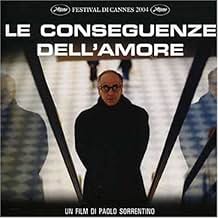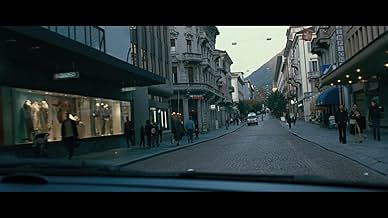NOTE IMDb
7,5/10
20 k
MA NOTE
La vie d'un introverti change complètement quand il se trouve attiré par une jeune serveuse.La vie d'un introverti change complètement quand il se trouve attiré par une jeune serveuse.La vie d'un introverti change complètement quand il se trouve attiré par une jeune serveuse.
- Réalisation
- Scénariste
- Stars
- Récompenses
- 20 victoires et 21 nominations au total
Vincenzo Vitagliano
- Pippo D'Antò
- (as Enzo Vitagliano)
7,520.2K
1
2
3
4
5
6
7
8
9
10
Avis à la une
Beautiful till the end
Although I totally agree with the previous comment regarding the marvellous acting of Toni Servillo as Titta Di Girolamo, I would also like to add the beautiful filming and montage which turns this movie virtually into a painting. The young director Paolo Sorrentino had the courage to experiment with different types of camera techniques which reminded me of Darren Aronofsky' Requiem for a Dream. They both used the same MTV-style filming combined with modern (alternative/techno) music, making the film Le Consequenze dell'Amore - stand apart from the other crime/mafia movies in its genre. Even though the movie may start of very slow-paced almost "sec" compared to the faster Hollywood productions it should be enjoyed cause of its serenity, marvellous character portray and splendid ending. Definitely a must see for people who enjoy the European/Italian cinema. PS Toni keep on acting like this we need an encore.
wonderful
OK, I'm Italian but there aren't so many Italian film like this. I think that the plot is very good for 3/4 of the film but the final is too simple, too predictable. But it's the only little mistake. The Consequences of Love in my opinion have great sequences in particular at the beginning and great soundtrack. I'd like very much the lighting work on it. The best thing on it is a great, great actor. You know, if your name were Al Pacino now everybody would have still been talking about this performance. But it's only a great theater Italian actor called Toni Servillo. Yes, someone tell me this film and this kind of performance it's too slow, it's so boring, so many silences, but i think that this components its fantastic, its the right way for describing the love story between a very talented young girl, the grand-daughter of the Italian actress Anna Magnani, Olivia and the old mysterious man Toni. One of my favorite Italian films.
Little known film that is a gem
I saw this the week it opened four years ago and I really did not know what to expect being unfamiliar with Sorrentino's work at the time. He has created a very intriguing and ultimately moving account of an odd character, one for whom the phrase 'life is for living' no longer applies. It outwitted me at every turn and I was constantly surprised by the story. I enjoyed the pacing very much and the way I was gradually given the pieces to work out what was happening. Tony Servillo is superb, as is Magnani. It opens with a brilliantly stylish wide shot and concludes with a very moving image that takes the movie into sublime territory. I thought long afterwards about the main character and the position he was in and his final fate and I didn't shake it for weeks. I recently bought the film and that final scene where he thinks about his friend gets me every time. I still have yet to talk to anyone who has seen this. It's a shame that it did not reach a wider audience as if this is the direction of Italian cinema it can only be a good thing.
Beneath the serenity of daily living lies the lies or truth?
This is a very visual film. By that I mean that the dialog is sparse, almost to the point of being a silent movie for some very long takes, beginning with the opening shot.
The silences, however, are broken by a stunning sound track that ranges from discordant, staccato beats to a haunting mix of violins, and interspersed with vocals that sound like dreams. It's a feast for the ears as much as for the eyes, one of the early visuals being a man walking along a street, so preoccupied with his interest in a shapely woman, that he walks into a lamppost: one of the consequences of love and a metaphor for what lies in store...
A long time ago, another movie Love Story (1970) -- said that love is never having to say you're sorry. This narrative turns that idea on its head in a number of ways, beginning with the main character, Titta (Toni Sevillo), a seemingly innocuous long-term resident in a plush hotel somewhere in Switzerland. Everyday, week in, week out, he sits at the same coffee table, enjoying the passing world, his cigarettes, his coffee, his solitude and he's been doing it for ten years. He sits, he observes, and once a week he engages in three very surprising activities that you'll find out about when you see this little masterpiece...
Love is explored in another way, in a direct counterpoint to Titta's solitude and reserved nature: two older residents of the hotel are still much in love, but the man wants to die in a spectacular manner when his time comes, while his long suffering wife berates him for cheating at cards with the other guests, one of whom is Titta. Now, Titta knows about their squabbles, their love, the man's cheating, his apologies to his wife, and his whining. How? In a surprising and black-comedic manner...one of those surprise activities I mentioned.
But, this is no comedy, in reality, although it does touch upon the idea of the human comedy in a Balzacian sense: the irony of life and what to do with it. That decision had been made for Titta ten years earlier when he left his wife and began to live in the hotel. He keeps in touch occasionally, and it is clear that he still loves his children (now grown up) and the sorrow in his voice speaks volumes. But, there's something more than just sorrow...
Such a life as Titta's would obviously seem to be utterly boring, and it actually is from many perspectives. It is only when we learn what lies beneath his almost death-like countenance, however, that the horror of his situation hits the viewer between the eyes. But not before we know that the female bartender, Sofia (Olivia Magnani), is very interested in Titta and goes out of her way to pique Titta's interest in her.
And that's when things start to unravel for Titta: he eventually succumbs to her femininity and in doing so discovers, once again, the consequences of love. Ironically, in doing so, he finally realizes what he must finally do with his life, and in a most spectacular fashion.
I know that all of the above is somewhat cryptic; but, to say more would spoil the film and story for you. If you like Italian cinema I love it! I urge you to see this one. The acting is superb; the sound track chills the spine; the camera work is truly innovative; the direction shows the maturity of a true artist.
I know I'll see this movie again, and again...
The silences, however, are broken by a stunning sound track that ranges from discordant, staccato beats to a haunting mix of violins, and interspersed with vocals that sound like dreams. It's a feast for the ears as much as for the eyes, one of the early visuals being a man walking along a street, so preoccupied with his interest in a shapely woman, that he walks into a lamppost: one of the consequences of love and a metaphor for what lies in store...
A long time ago, another movie Love Story (1970) -- said that love is never having to say you're sorry. This narrative turns that idea on its head in a number of ways, beginning with the main character, Titta (Toni Sevillo), a seemingly innocuous long-term resident in a plush hotel somewhere in Switzerland. Everyday, week in, week out, he sits at the same coffee table, enjoying the passing world, his cigarettes, his coffee, his solitude and he's been doing it for ten years. He sits, he observes, and once a week he engages in three very surprising activities that you'll find out about when you see this little masterpiece...
Love is explored in another way, in a direct counterpoint to Titta's solitude and reserved nature: two older residents of the hotel are still much in love, but the man wants to die in a spectacular manner when his time comes, while his long suffering wife berates him for cheating at cards with the other guests, one of whom is Titta. Now, Titta knows about their squabbles, their love, the man's cheating, his apologies to his wife, and his whining. How? In a surprising and black-comedic manner...one of those surprise activities I mentioned.
But, this is no comedy, in reality, although it does touch upon the idea of the human comedy in a Balzacian sense: the irony of life and what to do with it. That decision had been made for Titta ten years earlier when he left his wife and began to live in the hotel. He keeps in touch occasionally, and it is clear that he still loves his children (now grown up) and the sorrow in his voice speaks volumes. But, there's something more than just sorrow...
Such a life as Titta's would obviously seem to be utterly boring, and it actually is from many perspectives. It is only when we learn what lies beneath his almost death-like countenance, however, that the horror of his situation hits the viewer between the eyes. But not before we know that the female bartender, Sofia (Olivia Magnani), is very interested in Titta and goes out of her way to pique Titta's interest in her.
And that's when things start to unravel for Titta: he eventually succumbs to her femininity and in doing so discovers, once again, the consequences of love. Ironically, in doing so, he finally realizes what he must finally do with his life, and in a most spectacular fashion.
I know that all of the above is somewhat cryptic; but, to say more would spoil the film and story for you. If you like Italian cinema I love it! I urge you to see this one. The acting is superb; the sound track chills the spine; the camera work is truly innovative; the direction shows the maturity of a true artist.
I know I'll see this movie again, and again...
Distinguished & deliciously cool
The opening shot is hypnotic, drawing you in. Into a world of strangeness and solemnity. A deep, Italian baritone-voiced narrator making the invite ever more enticing. Then:
A middle-aged gentleman just sits in the hotel lounge, looking intelligent and distant, distinguished but also downright arrogant and rude. He never speaks to staff, or other guests, even, despite having been in residence for ten years.
He does something, without fail every Wednesday - and a couple more things the same day, once a year.
The sort of gentleman one could chance upon in any hotel, pretty well anywhere in the world. A poker-face of nothingness, smoking his life away, his concentration on his inner world only broken by the burned out cigarette stub. The excellent acting of Toni Servillo, coupled with the sublime direction of Paolo Sorrentino, employing a Kubrick style of slo-steadicam, with an ever sense of steady dread.
Always compelling rather than propelling, the story unfolds with Servillo's character, Titta, as he leads this strictly regimented life until confronted by the stunning Sofia, the barmaid. She looks at him straight in his eye and states that she's made his bed, served him this and that, had always been polite and courteous for the three years she's worked there. And he's never had the decency to utter a single word to her.
Instead of being nice back or even saying anything at all, we're aware that a flicker of something human has sparked within him. But, as the very title states, this lowering of his guard could very well be his downfall.
What does, however inflame this film and raises it even higher are the occasional flurries of activity. Titta hardly does anything more than almost nothing (driving one block, or looking around - not buying, though - a shopping mall) is accompanied by very loud punk rock music. This is unsettling - is this a dream he's having? Does he yearn for the fast life? Are the people he meets from a past, productive life? Do the characters he encounters then have any relevance to him - and to his situation now? The scenes look very real; the mood and ambiance are definitely not.
Moving on into the realms of more conventional crime drama, but still with a cool unease and an almost Memento meditative pace, the whole reveals lives and opportunities lost. Of redemptive longing and knowing one's own fate. This is an intelligent film that refuses to retread a potentially familiar path.
If in the U.K, BBC4 shows it again, wrap yourself inside it, be enveloped by it. You'll want to watch all of it, not that you know why but you'll be glad that you did. It's only 90mins. I've seen The Consequences... four times now, and I never tire of it. The ending will have you quietly shocked and amazed, too.
A middle-aged gentleman just sits in the hotel lounge, looking intelligent and distant, distinguished but also downright arrogant and rude. He never speaks to staff, or other guests, even, despite having been in residence for ten years.
He does something, without fail every Wednesday - and a couple more things the same day, once a year.
The sort of gentleman one could chance upon in any hotel, pretty well anywhere in the world. A poker-face of nothingness, smoking his life away, his concentration on his inner world only broken by the burned out cigarette stub. The excellent acting of Toni Servillo, coupled with the sublime direction of Paolo Sorrentino, employing a Kubrick style of slo-steadicam, with an ever sense of steady dread.
Always compelling rather than propelling, the story unfolds with Servillo's character, Titta, as he leads this strictly regimented life until confronted by the stunning Sofia, the barmaid. She looks at him straight in his eye and states that she's made his bed, served him this and that, had always been polite and courteous for the three years she's worked there. And he's never had the decency to utter a single word to her.
Instead of being nice back or even saying anything at all, we're aware that a flicker of something human has sparked within him. But, as the very title states, this lowering of his guard could very well be his downfall.
What does, however inflame this film and raises it even higher are the occasional flurries of activity. Titta hardly does anything more than almost nothing (driving one block, or looking around - not buying, though - a shopping mall) is accompanied by very loud punk rock music. This is unsettling - is this a dream he's having? Does he yearn for the fast life? Are the people he meets from a past, productive life? Do the characters he encounters then have any relevance to him - and to his situation now? The scenes look very real; the mood and ambiance are definitely not.
Moving on into the realms of more conventional crime drama, but still with a cool unease and an almost Memento meditative pace, the whole reveals lives and opportunities lost. Of redemptive longing and knowing one's own fate. This is an intelligent film that refuses to retread a potentially familiar path.
If in the U.K, BBC4 shows it again, wrap yourself inside it, be enveloped by it. You'll want to watch all of it, not that you know why but you'll be glad that you did. It's only 90mins. I've seen The Consequences... four times now, and I never tire of it. The ending will have you quietly shocked and amazed, too.
Le saviez-vous
- AnecdotesThe book the girl at the table reads is Louis-Ferdinand Céline's "Voyage au bout de la Nuit" (1932).
- GaffesThe barrel of the tracksuit-clad assassin's fired gun, lying on the hotel mattress while the assassin is packing for departure, appears defective, i.e., rubbery, as the silencer barrel is angled downward. Moments later, after he picks up the gun and points it at the hotel room door, the barrel appears longer and straighter, as it was in the earlier scenes.
- Citations
Titta: In the world there's a certain kind of cult, with men and women of all social classes, of all ages and of all religions. It is the insomniacs cult. I'm part of it. For ten years. Those who don't belong to the cult sometimes tend to say: "If you can't sleep, you can read, watch TV, study or do something else". That kind of phrase is deeply annoying to the members of the cult. And the reason is simple. Cause the insomniac has only one obsession: to sleep.
Meilleurs choix
Connectez-vous pour évaluer et suivre la liste de favoris afin de recevoir des recommandations personnalisées
- How long is The Consequences of Love?Alimenté par Alexa
Détails
Box-office
- Budget
- 2 000 000 € (estimé)
- Montant brut mondial
- 2 556 056 $US
- Durée
- 1h 40min(100 min)
- Couleur
- Mixage
- Rapport de forme
- 2.35 : 1
Contribuer à cette page
Suggérer une modification ou ajouter du contenu manquant

![Regarder Trailer [OV]](https://m.media-amazon.com/images/M/MV5BYTE4NzdmOGQtOTU4OC00YTJlLThiYzQtYjkwZWZlMDEzMzVjXkEyXkFqcGdeQXRyYW5zY29kZS13b3JrZmxvdw@@._V1_QL75_UX500_CR0)




























